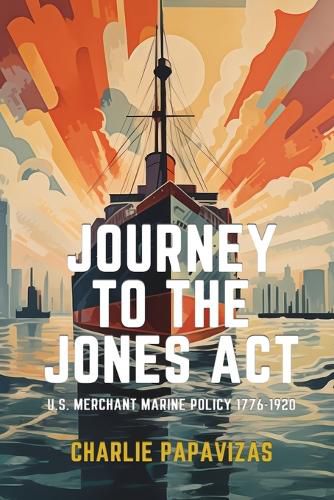Readings Newsletter
Become a Readings Member to make your shopping experience even easier.
Sign in or sign up for free!
You’re not far away from qualifying for FREE standard shipping within Australia
You’ve qualified for FREE standard shipping within Australia
The cart is loading…






This title is printed to order. This book may have been self-published. If so, we cannot guarantee the quality of the content. In the main most books will have gone through the editing process however some may not. We therefore suggest that you be aware of this before ordering this book. If in doubt check either the author or publisher’s details as we are unable to accept any returns unless they are faulty. Please contact us if you have any questions.
The "Jones Act" is the most newsworthy U.S. maritime policy law.Most of the attention is focused on the preservation of U.S. domestic maritime trade. Some is focused on the law as a means for mariners to recover for injuries.But this attention is too narrow. The "Jones Act" was originally understood to mean the whole of the 1920 Merchant Marine Act, which deals with far more than domestic maritime trade and mariner injuries. The 1920 Act was the culmination of U.S. merchant marine policies inherited from England and adapted over time by the United States starting in 1776.This merchant marine policy history is American history with the well-known, like James Madison, and the obscure, like Senator Wesley Livsey Jones, playing their parts. And it is relevant history because the U.S. merchant marine has always been an essential component of U.S. national defense and the economic conditions that made sustaining a U.S. merchant marine on the high seas difficult are the same today as they were in 1920.Charlie Papavizas captures a rich history from the early 17th century English Navigation Acts to the Constitutional Convention, where slavery and maritime policy were connected, to the Civil War, where the U.S. merchant marine suffered a catastrophic decline, to the decades of failed revival efforts, and finally to the building of a great merchant fleet of vessels in World War I and the plan to make permanent America's place in the maritime world with that fleet-which was the Jones Act.
$9.00 standard shipping within Australia
FREE standard shipping within Australia for orders over $100.00
Express & International shipping calculated at checkout
This title is printed to order. This book may have been self-published. If so, we cannot guarantee the quality of the content. In the main most books will have gone through the editing process however some may not. We therefore suggest that you be aware of this before ordering this book. If in doubt check either the author or publisher’s details as we are unable to accept any returns unless they are faulty. Please contact us if you have any questions.
The "Jones Act" is the most newsworthy U.S. maritime policy law.Most of the attention is focused on the preservation of U.S. domestic maritime trade. Some is focused on the law as a means for mariners to recover for injuries.But this attention is too narrow. The "Jones Act" was originally understood to mean the whole of the 1920 Merchant Marine Act, which deals with far more than domestic maritime trade and mariner injuries. The 1920 Act was the culmination of U.S. merchant marine policies inherited from England and adapted over time by the United States starting in 1776.This merchant marine policy history is American history with the well-known, like James Madison, and the obscure, like Senator Wesley Livsey Jones, playing their parts. And it is relevant history because the U.S. merchant marine has always been an essential component of U.S. national defense and the economic conditions that made sustaining a U.S. merchant marine on the high seas difficult are the same today as they were in 1920.Charlie Papavizas captures a rich history from the early 17th century English Navigation Acts to the Constitutional Convention, where slavery and maritime policy were connected, to the Civil War, where the U.S. merchant marine suffered a catastrophic decline, to the decades of failed revival efforts, and finally to the building of a great merchant fleet of vessels in World War I and the plan to make permanent America's place in the maritime world with that fleet-which was the Jones Act.